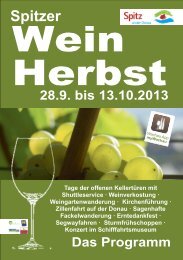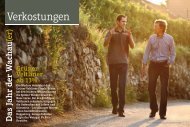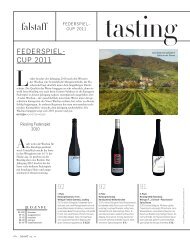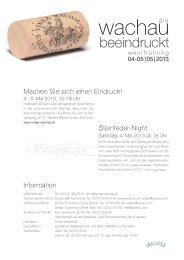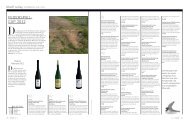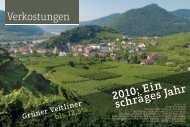The Charter of Pure Wine - Vinea Wachau
The Charter of Pure Wine - Vinea Wachau
The Charter of Pure Wine - Vinea Wachau
Create successful ePaper yourself
Turn your PDF publications into a flip-book with our unique Google optimized e-Paper software.
CODEX<br />
WACHAU<br />
<strong>The</strong> <strong>Charter</strong> <strong>of</strong> <strong>Pure</strong> <strong>Wine</strong><br />
For the <strong>Vinea</strong> <strong>Wachau</strong>, wine is a completely natural product, one which represents<br />
its area <strong>of</strong> origin and the distinctions <strong>of</strong> the area as well. <strong>The</strong> Codex <strong>Wachau</strong> and<br />
the trademarks Steinfeder ® , Federspiel ® und Smaragd ® are a declaration <strong>of</strong> dedication<br />
to natural wine production and strict control.<br />
<strong>The</strong> 6 pillars <strong>of</strong> the “Codex <strong>Wachau</strong>” are:<br />
Strictest principles<br />
concerning origin<br />
<strong>The</strong> <strong>Vinea</strong> <strong>Wachau</strong> is obligated to ensure that<br />
their wines come exclusively from the<br />
<strong>Wachau</strong> wine-growing region and are bottled<br />
there as well. In addition, <strong>Wachau</strong> premiumquality<br />
wines may not be sold outside <strong>of</strong> the<br />
<strong>Wachau</strong> in barrels or tanks.<br />
II<br />
III<br />
IV<br />
V<br />
VI<br />
No additives<br />
<strong>The</strong> <strong>Vinea</strong> winegrowers work without<br />
any additives (chaptalisation and/or<br />
RTK=rectified grape/must concentrate).<br />
This means that the quality <strong>of</strong> the wine in<br />
the glass is determined solely by nature –<br />
the maturity potential <strong>of</strong> the individual<br />
vintage and the resultant natural sugar<br />
content <strong>of</strong> the grape. This results in the<br />
denomination <strong>of</strong> the <strong>Vinea</strong> <strong>Wachau</strong> wines<br />
as Steinfeder ® , Federspiel ® or Smaragd ® .<br />
No concentration<br />
<strong>The</strong> <strong>Vinea</strong> winegrowers do without any<br />
artificial concentration. This means that<br />
the natural composition <strong>of</strong> the grapes,<br />
must and wine may not be altered using<br />
technical methods (vacuum distillation,<br />
reverse osmosis, kyroextraktion /grape<br />
freezing, etc.).<br />
No aromatisation<br />
It is guaranteed that no aromatisation<br />
takes place. This means that the <strong>Vinea</strong><br />
winegrowers do without any adulteration<br />
<strong>of</strong> the natural aroma structure – barrique<br />
use, wood chips and tannin powder are<br />
not permitted.<br />
No fractionation<br />
It is guaranteed that no fractionation occurs.<br />
This means that, although the decomposition<br />
<strong>of</strong> wines into their individual components<br />
and the arbitrary re-composition (“spinning<br />
cone column”) is permitted for foreign wines,<br />
the <strong>Vinea</strong> winegrowers regard this<br />
technology as a betrayal <strong>of</strong> nature and, <strong>of</strong><br />
course, make no use <strong>of</strong> it.<br />
Nature and nothing else<br />
<strong>The</strong> <strong>Vinea</strong> winegrowers renounce many <strong>of</strong><br />
the possibilities that can be undertaken in<br />
the contemporary wine business – which<br />
means the same as manipulating nature –<br />
for the production <strong>of</strong> their Steinfeder ® ,<br />
Federspiel ® and Smaragd ® wines. <strong>The</strong> grapes<br />
are harvested by hand and late in the season<br />
(attaining a high physiological ripeness<br />
potential is an indication <strong>of</strong> the high level <strong>of</strong><br />
willingness to take risks).<br />
<strong>The</strong> natural state is <strong>of</strong> paramount importance!
<strong>The</strong> <strong>Vinea</strong> <strong>Wachau</strong><br />
<strong>The</strong> <strong>Vinea</strong> <strong>Wachau</strong> (<strong>Vinea</strong> <strong>Wachau</strong> Nobilis<br />
Districtus – <strong>The</strong> Noble <strong>Wine</strong>growing Area <strong>of</strong><br />
the <strong>Wachau</strong>) was founded in 1983. It is an<br />
association <strong>of</strong> <strong>Wachau</strong> winegrowers who<br />
produce wines exclusively originating from a<br />
legally demarcated area <strong>of</strong> cultivation and who<br />
have an uncompromising commitment to<br />
quality, origin and purity.<br />
<strong>The</strong> name can be traced back to Leuthold I von<br />
Kuenring (1243–1313), who was regarded as<br />
“Austria’s supreme innkeeper”. <strong>The</strong> core area <strong>of</strong><br />
his properties today makes up the “<strong>Wachau</strong><br />
<strong>Wine</strong>growing Area”.<br />
Unique – Europe-wide<br />
<strong>The</strong> strongest expression for <strong>Vinea</strong><br />
<strong>Wachau</strong> quality are the registered<br />
trademarks Steinfeder ® , Federspiel ®<br />
and Smaragd ® .<br />
<strong>The</strong>se brandmarks stand for natural wine<br />
production, guaranteed origin and strict control.<br />
<strong>The</strong> wines are considered ambassadors <strong>of</strong> the<br />
Austrian white wine culture – and especially <strong>of</strong><br />
the World Cultural Heritage <strong>Wachau</strong>. Not only<br />
are the three designations unique in Austria, but<br />
a similar example <strong>of</strong> them cannot be found in all<br />
<strong>of</strong> Europe. Most importantly, the designations<br />
serve as an orientation structure for wine lovers,<br />
because it allows for dry white wines to be<br />
defined according to three weight classes, each <strong>of</strong><br />
which is based on natural alcohol content.<br />
Fruity charm and a<br />
stipulated maximum alcohol content <strong>of</strong> 11.5% by<br />
volume characterize the lightest style <strong>of</strong> top <strong>Vinea</strong><br />
<strong>Wachau</strong> wines – the Steinfeder ® .<br />
<strong>The</strong> name itself refers to the typical “Steinfedergras”<br />
(Stipa pennata), a grass which grows near the<br />
vines in the <strong>Wachau</strong>´s terraced vineyards; it is light<br />
like a feather, and fragrant – just like the wine<br />
named after it.<br />
This classic dry wine is<br />
distinguished by a strong,<br />
nuance-rich character.<br />
Federspiel ® wines feature a<br />
must weight <strong>of</strong> at least 17° KMW and an alcohol<br />
content <strong>of</strong> between 11.5% and 12.5% by volume.<br />
<strong>The</strong> name Federspiel refers back to the times<br />
<strong>of</strong> falconry, when this favourite form <strong>of</strong> noble<br />
hunting was practiced in the <strong>Wachau</strong>.<br />
Smaragd ® is the name<br />
for the best, most treasured wines from the <strong>Vinea</strong><br />
<strong>Wachau</strong> members. <strong>The</strong> alcohol content <strong>of</strong> these wines<br />
begin at 12.5% by volume. This, along with the highest<br />
grape ripeness and natural concentration are what<br />
make this world-class designation possible. Emeraldcoloured<br />
lizards – also known as Smaragd – are at<br />
home in the terraced vineyards <strong>of</strong> the <strong>Wachau</strong>.<br />
On bright, sunny days, their beauty is highlighted<br />
dramatically as they bask in the gleaming sun next to<br />
the grapevines – the perfect symbol for the absolute<br />
top <strong>Wachau</strong> wines with full physiological ripeness.<br />
<strong>Wine</strong> shapes people and the landscape –<br />
the terroir creates the character;<br />
the winegrower, the quality.<br />
— Anton R. Bodenstein<br />
Austria’s best-known<br />
wine-growing area:<br />
the <strong>Wachau</strong><br />
<strong>The</strong> <strong>Wachau</strong> was mentioned for the first time<br />
in a Carolingian document from 823. <strong>The</strong><br />
origin <strong>of</strong> the tradition <strong>of</strong> wine growing can<br />
be traced back to the period <strong>of</strong> the Roman<br />
settlement <strong>of</strong> the <strong>Wachau</strong> and experienced<br />
its first peak under the Carolingians. In the<br />
middle ages, <strong>Wachau</strong> wines were known far<br />
beyond the borders <strong>of</strong> Austria.<br />
K<strong>of</strong>inanziert durch die<br />
Europäische Union<br />
© Fotos: L. Lammerhuber, NÖ-Werbung; S. Wood; Weingut Hirtzberger; <strong>Vinea</strong> <strong>Wachau</strong>.<br />
Steinfeder ® , Federspiel ® und Smaragd ® are registered trademarks <strong>of</strong><br />
<strong>Vinea</strong> <strong>Wachau</strong> Nobilis Districtus. Use is limited to its member wineries.<br />
VINEA WACHAU NOBILIS DISTRICTUS<br />
Schlossgasse 3 . 3620 Spitz/Donau . Austria<br />
Tel.: +43 (0)27 13/3 00 00-12<br />
Fax: +43 (0)27 13/3 00 00-40<br />
<strong>of</strong>fice@vinea-wachau.at<br />
www.vinea-wachau.at



